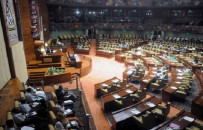Sindh to increase revenue from property tax and non-tax receipts
According to Sindh finance secretary, the assets of Karachi Municipal Corporation alone are worth around $5 billion.

The government's income from property is part of its non-tax receipts. A sum of Rs28.8 billion was set under this head but the government ended up raising only around Rs11 billion this year.PHOTO: FILE
The Sindh government is considering devolving the responsibility of property tax collection to the municipal administrations in a bid to enhance receipts from the levy. Against the target of Rs4.5 billion, only Rs4 billion were able to be collected in the concluding fiscal year, 2013-14.
"Karnataka state in India is almost the size of Sindh but it collects Rs42 billion in property tax compared to our target of just over Rs2 billion," said Sindh finance secretary Sohail Rajput at a post-budget briefing at the Hyderabad Press Club on Sunday.
The government's income from property is part of its non-tax receipts. A sum of Rs28.8 billion was set under this head but the government ended up raising only around Rs11 billion this year.
It also fell short of collecting Rs6.185 billlion from the sale of state land, which constitutes the largest component of the non-tax receipts, as only Rs1.98 billion could be raised. "The sale was mostly hampered by litigation over state land," said Rajput.
Making his argument for empowering the municipalities, the secretary said that revenue collection from property tax is a major source of income for municipal administrations in developed countries. "Even in a district like Hyderabad, there are thousands of bungalows sprawling over 400 to 1,000 square yards," he said. "There are also as many apartment buildings. However, the tax collection from the purchase or sale of these properties remains very low."

According to him, the assets of Karachi Municipal Corporation alone are worth around $5 billion. Inefficient management of the resources, however, has made the KMC dependent on financial support from the provincial government.
The secretary also criticised the performance of the water and sanitation agencies in Karachi and Hyderabad. He said that the Karachi Water and Sewerage Board and Water and Sanitation Agency in Hyderabad were established as autonomous and self-sustaining bodies but both had failed to become self-sufficient. The budget has set aside Rs5 billion for the KWSB and Rs800 million for WASA, so both can pay salaries and utility bills on time.
In response to a question regarding the dilapidated condition of infrastructure in Hyderabad, Raput said that Rs15 billion have been given to the city in over eight years. "To be honest, I can't see where that money was invested," he said. The city, he added, will be given Rs2 billion under different heads of development this year including Rs733 million for roads, water supply and drainage.
The secretary reiterated the Sindh government's demand from the centre for greater fiscal decentralisation and levy of tax on oil exploration. According to him, the federal government collects excise duty, royalty and development surcharge. But all of the revenue is transferred to the province after deduction of one per cent collection charges.
Law and order
The secretary revealed that 10,000 policemen will be appointed during the fiscal year, 2014-15. The budget for law enforcement agencies has been earmarked at Rs55 billion, including Rs2.22 billion for Rangers and Rs942 million for the Frontier Constabulary. The remaining will go to the police department.
Published in The Express Tribune, June 16th, 2014.



















COMMENTS
Comments are moderated and generally will be posted if they are on-topic and not abusive.
For more information, please see our Comments FAQ